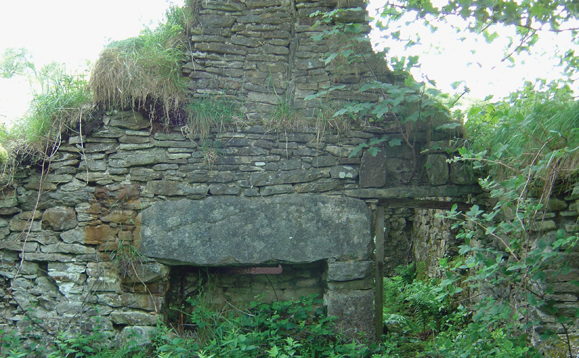Culdalee
We took the winding road west from Aclair,
arrived at where we thought the turnoff should be,
the boreen so overgrown you’d hardly know it had ever
been the way.
We waded down through the uncut field, down the steep
hillside to the wild valley below.
Thankfully, the cottage still stood,
looking much as it did when I saw it last, forty years ago.
“Culdalee,” my cousin said. “Culdalee,”
saying the syllables that had dropped so sweetly
from my grandmother’s tongue.
Culdalee, where I had gone with her once as a boy,
the place already a ruin.
But still the old stone cottage stood,
the roof gables and chimney proud against the sky,
the thatch having fallen in fifty years ago,
the massive hearthstone an earthquake could not unseat.
We could light a fire here and cook a meal
as my ancestors did these three centuries past.
Irish was spoken here, only Irish,
though they had English enough for the wider world as well.
Winnie, Anne, and Austin were the last—
an old picture of them I treasure—
and old Kate Kilmartin—Kate who lived to a hundred and eight,
from before the Great Famine to the Second World War.
We walked across to the ancient ring fort where I’d played
as a child, as my father did before me,
knelt beside the stream where two forks converged,
a brogue of birds in the blackthorn
the hawthorn and hazel obscuring the Giant’s Grave
across the grassy meadow.
Later, back at Tom’s place in Tourlestrane,
we lamented the death of Jack,
wondered who’d tend the sheep farm
high in the Ox Mountains—
a “sky farm” they call it, a sky farm
because up there it seems you must be
harvesting the sky.
The next day, we rode the winding rode west from Aclair,
arrived at where we knew the turnoff would be.
We walked the uncut field, down to the shambling,
moss-grown cottage.
We stood beside the massive walls, rested our hands
on the rounded stones
as if listening to the old place speak.
At last, my son selected one of the fallen stones
at the wall’s base
to trundle back through the airport
and place on our mantel back home.


I was just introduced to the poem “Culdalee” by Timothy Walsh in your news paper.
I am familiar with the area and must read more about you as i am community news reporter with The Sligo Weekender.
Best Wishes,
Bertie.
Hey Bertie,
Just saw your comment. The photo is the actual hearth of my family’s ruined cottage in Culdalee, which is near the old stone ring fort. This was my grandmother’s side of the family–Cunney. As you may know, there were many Cunnies in Culdalee village, which as far as I know is gone now. At one point, I checked census records and saw that there were about three dozen cottages in old Culdalee village–all gone now, I think. My cousin still owns the land where the ruined cottage stands.
All the best,
–Tim Walsh
Wow, such evocative beautifully expressed words which depict life there with such pathos so perfectly. A stunning poem, I feel moved and transported.
Hello and what a beautiful poem; i have a connection to Culdalee as my great grandfather Thaddeus Edward Commons/Commins was from there and he married a Bridget Walsh , so i was wondering Timothy about your Walsh family name ? very best Tim O’Connor